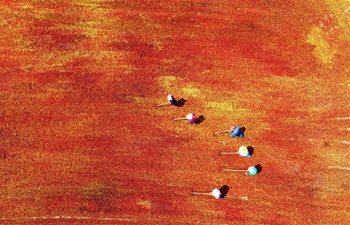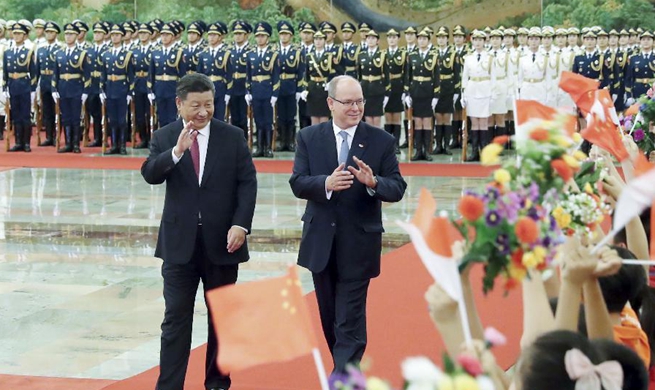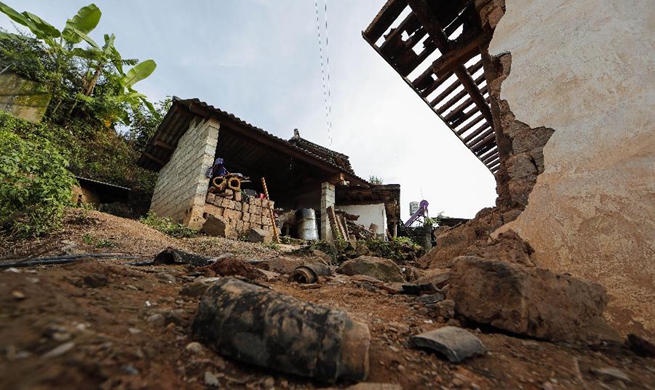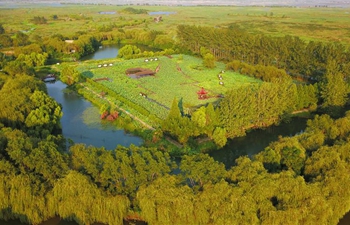ISTANBUL, Sept. 8 (Xinhua) -- Since Turkey is concerned about an impending Syrian offensive to retake the rebel-held province of Idlib that would cause a fresh wave of migrants toward its border, analysts are suggesting the re-establishment of dialogue with Damascus in a bid to minimize the threat and persuade rebels to lay down arms.
The first thing Ankara should do to eliminate the threats from Syria, including the worst scenarios caused by an Idlib operation, is to talk with Damascus, argued Cahit Armagan Dilek, a former staff officer with the Turkish military.
The Syrian army, backed by the Russian air force and Iran-linked militia, is preparing to launch an all-out offensive to wipe out the rebels from their last major stronghold in Idlib, where some 2.5 million people are living, including around 50,000 armed rebels.
Despite efforts of Russia and Iran, both staunch supporters of Damascus in the long-running war, to politically settle the Syrian conflict, Turkey has refused to have any official contact with the Syrian government which it sees as illegitimate.
Syrian and Russian jets as well as Syrian artillery have for several times pounded certain rebel-held areas in Idlib during the week.
Ankara said it expressed its discontent about the strikes to Moscow ahead of a trilateral summit on Idlib between Turkish, Russian and Iranian leaders in Tehran on Friday.
Ankara, Moscow and Tehran are partners in the Astana process aimed at ending clashes and setting the stage for a political settlement in Syria.
In the view of Dilek, the issue would be more easily coped with if Turkey could persuade what it calls moderate rebels in Idlib to hand over the areas under their control to the Syrian army.
Not only that the al-Qaida-linked radical groups would be contained in this way, but also that the clashes would be prevented from spreading all over the province, said Dilek, who currently heads the Ankara-based 21st Century Turkey Institute.
"This would considerably decrease the risk of a refugee influx toward Turkey," he added.
The al-Qaida-linked Hayat Tahrir al-Sham alliance controls much of the Idlib province, while Ankara-backed rebels hold the rest of the territory.
Turkey is concerned that a full-scale attack on Idlib would expose it to a major security risk by forcing millions of refugees toward its border. In addition, many fear that rebels disguised as civilians may also attempt to infiltrate into the country.
Turkey cannot afford to accommodate yet another 3.5 million refugees, Turkish President Recep Tayyip Erdogan said at the Tehran summit.
When Ankara starts talking with the Syrian government, it could more easily persuade the moderate groups to lay down arms, observed Hasan Koni, an analyst on international relations.
"Because it can then convincingly tell the rebels, given that it would be talking with Damascus, that it can ensure their inclusion in the political process," he said.
The Tehran summit revealed that Ankara did not agree on Idlib to be taken over by the Syrian army, while Erdogan's call for a cease-fire in the province was not accepted by Russia or Iran.
Erdogan warned that strikes on Idlib would collapse the ongoing Astana political process. "It's vitally important that Idlib's current status be maintained," he cautioned.
Under a deal concluded last year among Ankara, Moscow and Tehran in Kazakhstan's Astana, Idlib is one of the four areas designated as de-escalation zones, and the Turkish military has established there a total of 12 observation posts herein.
Koni, who teaches at Istanbul Kultur University, does not expect Ankara to switch sides due to disagreement on Idlib with its Astana partners, arguing that such a move would lead to troubled ties with Moscow and some other Asian powers.
Recalling damaged ties between Ankara and Moscow after Turkey shot down a Russian jet in 2015, Koni said, "if Ankara once again hurts Moscow, then it would find itself in a very difficult position as it could no longer exploit Russia as a balancing element against the U.S. in the future."
Until the summer of 2016 when Ankara started to mend ties with Moscow, Turkey supported, together with the United States, the rebels who fought to topple the Syrian government.
For Dilek, it is highly probable that Turkey would again partner with Washington in the Syrian theater.
"At the end of the day, Turkey will side with the U.S. due to its backstage engagements and its tendency to favor the U.S. game plan over Syria," he said.

















